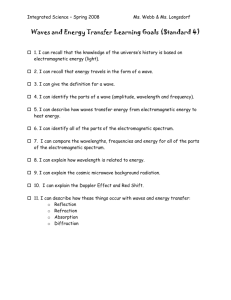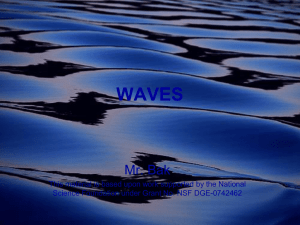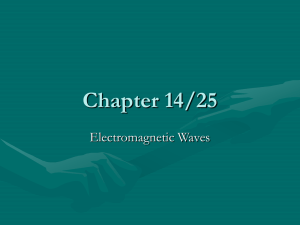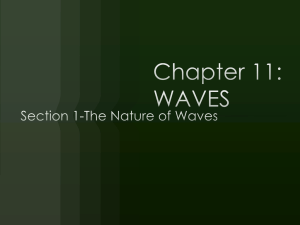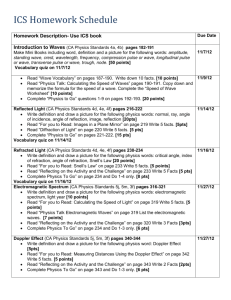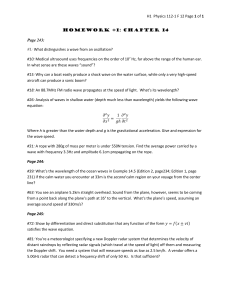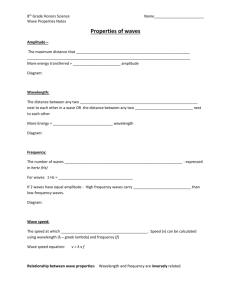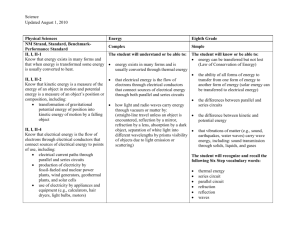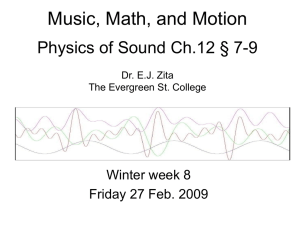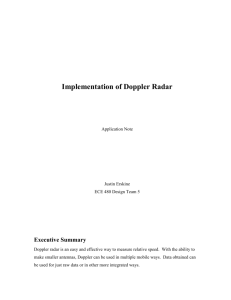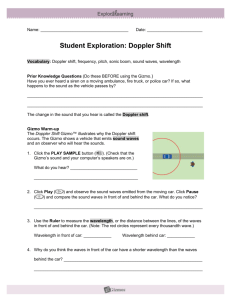MIAMI-DADE COUNTY PUBLIC SCHOOLS Student BYOD
advertisement
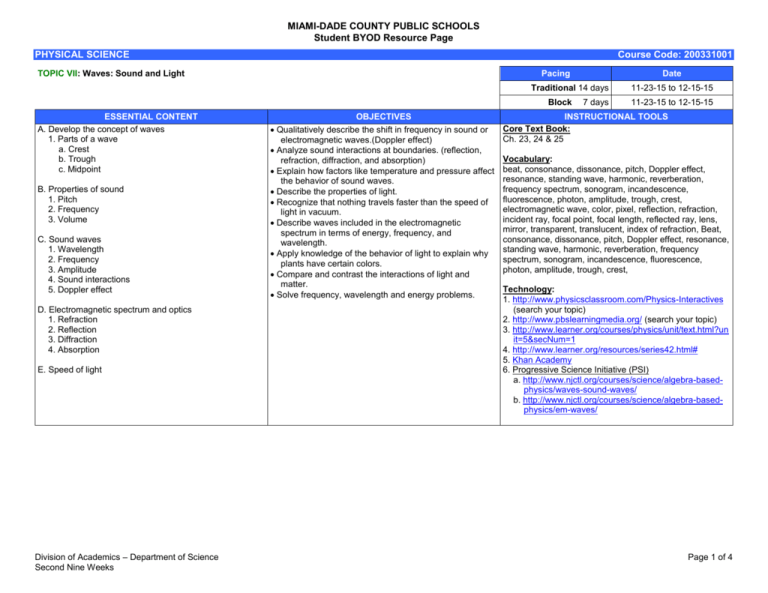
MIAMI-DADE COUNTY PUBLIC SCHOOLS Student BYOD Resource Page PHYSICAL SCIENCE Course Code: 200331001 TOPIC VII: Waves: Sound and Light Pacing Date Traditional 14 days Block ESSENTIAL CONTENT A. Develop the concept of waves 1. Parts of a wave a. Crest b. Trough c. Midpoint B. Properties of sound 1. Pitch 2. Frequency 3. Volume C. Sound waves 1. Wavelength 2. Frequency 3. Amplitude 4. Sound interactions 5. Doppler effect D. Electromagnetic spectrum and optics 1. Refraction 2. Reflection 3. Diffraction 4. Absorption E. Speed of light Division of Academics – Department of Science Second Nine Weeks OBJECTIVES Qualitatively describe the shift in frequency in sound or electromagnetic waves.(Doppler effect) Analyze sound interactions at boundaries. (reflection, refraction, diffraction, and absorption) Explain how factors like temperature and pressure affect the behavior of sound waves. Describe the properties of light. Recognize that nothing travels faster than the speed of light in vacuum. Describe waves included in the electromagnetic spectrum in terms of energy, frequency, and wavelength. Apply knowledge of the behavior of light to explain why plants have certain colors. Compare and contrast the interactions of light and matter. Solve frequency, wavelength and energy problems. 7 days 11-23-15 to 12-15-15 11-23-15 to 12-15-15 INSTRUCTIONAL TOOLS Core Text Book: Ch. 23, 24 & 25 Vocabulary: beat, consonance, dissonance, pitch, Doppler effect, resonance, standing wave, harmonic, reverberation, frequency spectrum, sonogram, incandescence, fluorescence, photon, amplitude, trough, crest, electromagnetic wave, color, pixel, reflection, refraction, incident ray, focal point, focal length, reflected ray, lens, mirror, transparent, translucent, index of refraction, Beat, consonance, dissonance, pitch, Doppler effect, resonance, standing wave, harmonic, reverberation, frequency spectrum, sonogram, incandescence, fluorescence, photon, amplitude, trough, crest, Technology: 1. http://www.physicsclassroom.com/Physics-Interactives (search your topic) 2. http://www.pbslearningmedia.org/ (search your topic) 3. http://www.learner.org/courses/physics/unit/text.html?un it=5&secNum=1 4. http://www.learner.org/resources/series42.html# 5. Khan Academy 6. Progressive Science Initiative (PSI) a. http://www.njctl.org/courses/science/algebra-basedphysics/waves-sound-waves/ b. http://www.njctl.org/courses/science/algebra-basedphysics/em-waves/ Page 1 of 4 MIAMI-DADE COUNTY PUBLIC SCHOOLS Student BYOD Resource Page PHYSICAL SCIENCE Course Code: 200331001 Doppler Effect SC.912.P.10.18 SC.912.P.10.21 Hearing: Frequency and Hearing: Frequency and Volume Basic Prism SC.912.P.10.18 SC.912.P.10.21 Sound Division of Academics – Department of Science Second Nine Weeks Page 2 of 4 MIAMI-DADE COUNTY PUBLIC SCHOOLS Student BYOD Resource Page PHYSICAL SCIENCE Course Code: 200331001 Image Article Electricity Radiation Nuclear Energy Electric Power Systems Video Standard: SC.912.P.10.1 Video Standard: SC.912.P.10.18 Image Energy Basics Kinetic and Potential Energy Nuclear Energy Chemical Energy Sound Energy James Prescott Joule, British scientist. J. Robert Oppenheimer (1904-1967). Light and the Spectrum: The Basics Planck’s Law Wien’s Law Stefan’s Law Properties of Light in the Ocean The Energy of Heat Energy Exchanges Energy Around Us Hoover Dam: Changing Potential Energy into Kinetic Energy Nuclear power plant, control room Hydroelectric power plant Optics Refraction What Is Light? Electromagnetic Waves Physics of Fun: Potential and Kinetic Energy Physical Energy Transformations Conservation of Energy and Matter in the Cell Cycle Nuclear reactor fuel rods The Photon Model of Light: Program Overview How Telescopes Work Using Lasers Technological Breakthroughs of 1994 The Eye: Detecting Light and Color Lens, double convex Concave mirror Edison, Thomas Alva Article Standard: SC.912.P.10.21 Video Division of Academics – Department of Science Second Nine Weeks Sound The Speed of Sound Properties of Sound in the Ocean Eerie Lake Sounds Breaking the Sound Barrier Sound is a Pressure Wave Loudspeaker: Sound Wave Velocity of Sound Sound Energy The Alan Nursall Experience: Volume 07: Vibration and Sound Pitch: Why Are Certain Sounds More Annoying than Others? Reverberation Using Sound as a Deterrent Ultrasound: Audio Precision Sound as Riot Control Sound Waves: The Magic of Music Using Sound in the Marine Environment Decibel Readings for Common Sounds Doppler Effect Introducing Doppler Shift Page 3 of 4 MIAMI-DADE COUNTY PUBLIC SCHOOLS Student BYOD Resource Page PHYSICAL SCIENCE Course Code: 200331001 Reading Passage Standard: SC.912.P.12.7 Video Video Division of Academics – Department of Science Second Nine Weeks The first film projector to play recorded Decibel level; Table sound Chromatic tuner The Speed of Light Calculating the Speed of Light The Finite Speed of Light Time Travel with the Speed of Light The Universal Speed Limit Faster Than the Speed of Light Shhhh! Colliding Sound Waves Cancel Each Other, Reduce Noise Levels Sound Waves Could Measure Ocean Warming, But Might Harm Marine Life Microwaves, Hypersonics and Slime: New Non-Lethal Weapons Developed E-Lamp is Breakthrough in Lighting Technology Microwaves and Microwave Ovens Art Detective Uses Radar Scans in Search for "Lost" DaVinci Fresco On Board the U.S.S. Memphis: Nuclear Subs Run Silent, Run Deep Under Wraps: Unraveling Ancient Mummies with Virtual Autopsies New Airport Scanners Reported Low Risk of Radiation Exposure Airport Security in Europe: Different Procedures - and Attitudes Do Personal Devices Really Pose Danger to Planes? Alexander Graham Bell Sound Recordings Played For the First Time Alexander Graham Bell Recording Discovered New York to London in an Hour? Pioneer 5 Space Probe Launched Telstar Communications Satellite Story Kennedy Uses Telstar to Beam Press Conference Fear and Concern in 1977: How Dangerous is Microwave Radiation? Doppler Radar Helps Track Precipitation, Detect Microbursts Ultrasound: High-Frequency Sound Waves Shatter Kidney Stones Columbia Shuttle Crew Studies Northern Lights, Sends Ham Radio Transmissions Page 4 of 4
